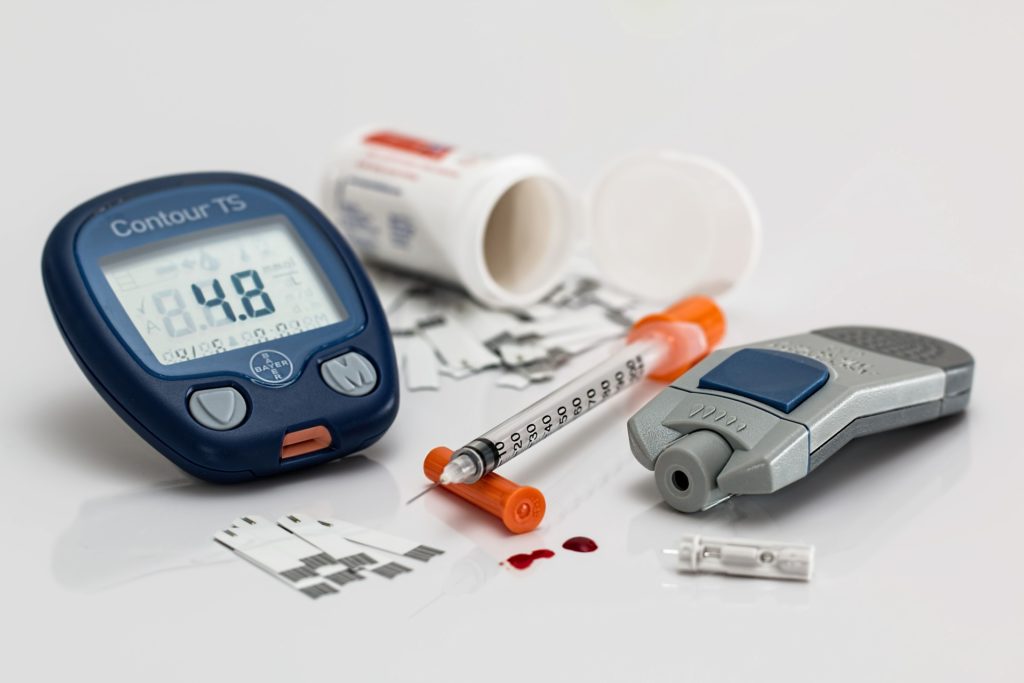Diabetes is a disease that affects the body’s ability to produce or use insulin effectively to control blood sugar, or glucose, levels. Although glucose is an important source of energy for the cells in the body, too much glucose in the blood for a prolonged period of time can cause damage to multiple parts of the body, including the heart, kidneys, blood vessels, and the small blood vessels in the eyes.
Diabetic Retinopathy
When blood sugar levels damage the blood vessels in the eye’s retina, which is the tissue lining the back of the eye, or if abnormal new blood vessels grow on the surface of the retina, it’s called diabetic retinopathy.
People with all types of diabetes—type 1, type 2, and gestational—are at risk for diabetic retinopathy. According to the National Eye Institute, approximately 40-45% percent of Americans who have been diagnosed with diabetes have some stage of diabetic retinopathy, although only about half of them are aware of it.
There are two main stages of diabetic retinopathy, NPDR (non-proliferative diabetic retinopathy) is the early stage and PDR (proliferative diabetic retinopathy) is the more advanced stage. If you have NPDR, your vision will likely be blurry. PDR is a more serious condition that can cause both central and peripheral vision loss.
Being diabetic is the highest risk factor for developing diabetic retinopathy, but other segments of the population are also at an increased risk, including:
- Pregnant women
- Those with high blood pressure, high blood lipids, or both.
- Those who are African-American, Hispanic, or Native American.
Your risk of developing diabetic retinopathy also increases the longer you have diabetes. For example, one woman developed the disease after living with type 1 diabetes for 25 years.
According to the Centers for Disease Control and Prevention (CDC), about 90 percent of diabetes-related vision loss can be prevented, but early detection is key. People with diabetes should get comprehensive annual eye exams well before before they have signs of vision loss. However, studies show that sixty percent of people who are diabetic are not getting the comprehensive eye exams that are critical for preventing vision loss from diabetic retinopathy.
Cataracts
There is also a link between diabetes and developing cataracts. Excess blood sugar can cause changes to the lens of the eye, resulting in cataracts which cause permanent blurring of vision. Cataract surgery may be necessary to remove the lenses that have become clouded by the effects of diabetes to replace them with clear intraocular lenses (IOLs). In addition, blood sugar spikes can cause temporary blurred vision, which usually subsides once blood sugar levels are under control.
Glaucoma
Glaucoma is the second most common cause of blindness in the U.S and is highly correlated with eye pressure, which can be affected by diabetes. Overtime, glaucoma damages the optic nerve but it usually develops slowly and symptoms often aren’t noticed until permanent damage has already occurred. In fact, glaucoma is often referred to as the “silent thief of sight” because vision loss occurs without obvious warning symptoms.
The good news is that you can take steps to preserve your vision and reduce your chances of diabetic eye disease or progressive vision loss. Follow these steps to preserve your vision in the years to come:
- Get a comprehensive dilated eye examination from your ophthalmologist at least once a year.
- Control your blood sugar.
- Keep blood pressure and cholesterol levels in check.
- Quit smoking if you currently do.
- Exercise.
East Tennessee Eye Surgeons specializes in the diagnosis and treatment of both the common and more complex eye diseases like diabetic retinopathy, cataracts, and glaucoma. With two locations at 7800 Conner Road in Powell and 744 Middle Creek Road, Suite 200 in Sevierville, East Tennessee Eye Surgeons delivers the highest quality eye care in an exceptional setting. Visit our website to learn more about us, or call us at 865-546-1464 (Powell) or 865-908-7008 (Sevierville).

